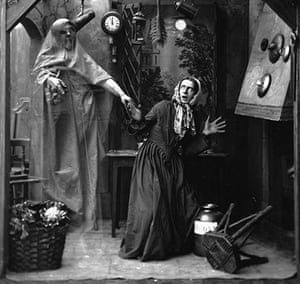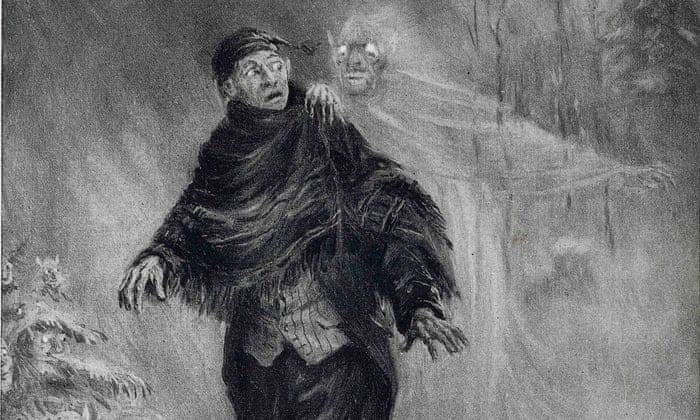As I happened to mention last year (
"Ghoulies and Ghosties"), ghost stories were one of the key features of a Victorian Christmas. And Dickens wrote more than one of them for the holidays:
One thing "The Haunted Man" shows is how obsessed Dickens was with memory, and his analysis of how memory fits in/creates who we are. From the opening scene, where he describes a portrait with the motto, "LORD, KEEP MY MEMORY GREEN", to the very last moment, it is a novella about memory. It has what is perhaps the first experiment in memory erasure in literature, which makes it a forerunner of Charlie Kaufman's "Eternal Sunshine of the Spotless Mind". Although in this case, it isn't love that makes our
self-induced amnesiac go for the darkness. Mr. Redlaw, brilliant professor of chemistry, comes back from his overflowing lecture halls to his lonely abode and sits and broods among his beakers about the endless, unbearable wrongs that have been done to him. Depressive, full of resentments, letting his mind feed and fester on them like rats in the walls, Mr. Redlaw is ripe to the point of rotten for any promise to get his own back. And what comes, well - here's Dickens:
Christmas Eve! (No chains clanking, no wailing in the hallways - but on the wall, where Milly Swidger (his landlady) put it), "the healthy holly withered on the wall, and dropped—dead branches."

Then, "As the gloom and shadow thickened behind him, in that place where it had been gathering so darkly, it took, by slow degrees,—or out of it there came, by some unreal, unsubstantial process—not to be traced by any human sense,—an awful likeness of himself!"
[This Spectre, this Phantom, listens to Redlaw's litany of woe, and, finally, offers him a solution]:
“Hear what I offer! Forget the sorrow, wrong, and trouble you have known!”
“Forget them!” Redlaw repeated.
“I have the power to cancel their remembrance—to leave but very faint, confused traces of them, that will die out soon,” returned the Spectre. “Say! Is it done?”
“Stay!” cried the haunted man, arresting by a terrified gesture the uplifted hand. “I tremble with distrust and doubt of you; and the dim fear you cast upon me deepens into a nameless horror I can hardly bear.—I would not deprive myself of any kindly recollection, or any sympathy that is good for me, or others. What shall I lose, if I assent to this? What else will pass from my remembrance?”
“No knowledge; no result of study; nothing but the intertwisted chain of feelings and associations, each in its turn dependent on, and nourished by, the banished recollections. Those will go.”
“Are they so many?” said the haunted man, reflecting in alarm.
“They have been wont to show themselves in the fire, in music, in the wind, in the dead stillness of the night, in the revolving years,” returned the Phantom scornfully.
“In nothing else?”
The Phantom held its peace. But having stood before him, silent, for a little while, it moved towards the fire; then stopped. “Decide!” it said, “before the opportunity is lost!”
“A moment! I call Heaven to witness,” said the agitated man, “that I have never been a hater of any kind,—never morose, indifferent, or hard, to anything around me. If, living here alone, I have made too much of all that was and might have been, and too little of what is, the evil, I believe, has fallen on me, and not on others. But, if there were poison in my body, should I not, possessed of antidotes and knowledge how to use them, use them? If there be poison in my mind, and through this fearful shadow I can cast it out, shall I not cast it out?”
“Say,” said the Spectre, “is it done?”
“A moment longer!” he answered hurriedly. “I would forget it if I could! Have I thought that, alone, or has it been the thought of thousands upon thousands, generation after generation? All human memory is fraught with sorrow and trouble. My memory is as the memory of other men, but other men have not this choice. Yes, I close the bargain. Yes! I WILL forget my sorrow, wrong, and trouble!”
“Say,” said the Spectre, “is it done?”
“It is!”
“It is. And take this with you, man whom I here renounce! The gift that I have given, you shall give again, go where you will. Without recovering yourself the power that you have yielded up, you shall henceforth destroy its like in all whom you approach. Your wisdom has discovered that the memory of sorrow, wrong, and trouble is the lot of all mankind, and that mankind would be the happier, in its other memories, without it. Go! Be its benefactor! Freed from such remembrance, from this hour, carry involuntarily the blessing of such freedom with you. Its diffusion is inseparable and inalienable from you. Go! Be happy in the good you have won, and in the good you do!”
In case you can't guess, this does not end well. Mr. Redlaw finds that, as he goes out into the world, he does indeed have the power to transmit the power of complete oblivion of all memories of wrong, hurt, sorrow, trouble of any kind: and the results are horrific.
He goes to the deathbed of Milly's brother-in-law, a man dying of alcoholism and vice, who calls to his father (old Mr. Swidger, Milly's father-in-law) “Father! I am dying, I know. I am so far gone, that I can hardly speak, even of what my mind most runs on. Is there any hope for me beyond this bed?”
But just then Redlaw touches him, just to help... With the result that the man closes his eyes; puts his hands over his face, and then emerges, and shouts out, scowling, “Why, d-n you! what have you been doing to me here! I have lived bold, and I mean to die bold. To the Devil with you!” And dies, unrepentant, unreconciled, unloving and unloved...
And it spreads - touching the dying/dead man makes old Mr. Swidger and Milly's husband, William Swidger quarrel over the deathbed as to which of them is the more selfish, old Swidger for still being alive or young Swidger for not giving him enough, i.e., everything.
And it spreads - to everyone Redlaw touches, even with his shadow, all lose all sense of gratitude, goodness, charity, hope... until finally even Redlaw knows that he is an infection, and he is horrified by himself. He flees back to his lonely room, withdrawn from everyone - from the Swidgers, from a poor student he was meant to help, from Milly... But he can't escape himself, and the worst is, perhaps, when he realizes that he destroyed all the good within himself when he sent his memory away with the Phantom.

The only one he cannot hurt is a homeless orphan off the streets who Milly Swidger took in: "A bundle of tatters, held together by a hand, in size and form almost an infant’s, but in its greedy, desperate little clutch, a bad old man’s. A face rounded and smoothed by some half-dozen years, but pinched and twisted by the experiences of a life. Bright eyes, but not youthful. Naked feet, beautiful in their childish delicacy,—ugly in the blood and dirt that cracked upon them. A baby savage, a young monster, a child who had never been a child, a creature who might live to take the outward form of man, but who, within, would live and perish a mere beast."
This boy never changes. Hard, starving, snatching, growling, snapping from beginning to end. Redlaw's touch makes no difference to this feral beast: and, when the Phantom returns, Redlaw begs to know why.
“This,” said the Phantom, pointing to the boy, “is the last, completest illustration of a human creature, utterly bereft of such remembrances as you have yielded up. No softening memory of sorrow, wrong, or trouble enters here, because this wretched mortal from his birth has been abandoned to a worse condition than the beasts, and has, within his knowledge, no one contrast, no humanising touch, to make a grain of such a memory spring up in his hardened breast. All within this desolate creature is barren wilderness. All within the man bereft of what you have resigned, is the same barren wilderness. Woe to such a man! Woe, tenfold, to the nation that shall count its monsters such as this, lying here, by hundreds and by thousands!”
Only one creature can touch the boy; only one creature can save the people whom Redlaw has damaged and destroyed; only one creature can (perhaps) heal Redlaw himself: Milly Swidger. Milly, the angel in the house, whose only child died immediately after birth, who has the answer that Redlaw has never even thought of as to why humans need the memory of trial and trouble:
Read "The Haunted Man" and find out what that answer is.
‘LORD! KEEP MY MEMORY GREEN!’


















